 Image: Shutterstock.
Image: Shutterstock.
An El Paso, Texas credit union told members Sept. 22 that they had one month to opt out of an agreement in which they waive their right to civil trials or participating in a class-action lawsuit, a Texas newspaper reported.
In a three-page mailing obtained by the El Paso Times, GECU ($3.7 billion in assets, 403,628 members) told its members they had until Oct. 22 to opt out of the agreement.
Recommended For You
The one-page letter from GECU President/CEO Crystal Long began:
"Dear Member. Thank you for your continued loyalty to GECU. As a member owned financial co-operative we are always mindful that it is our duty to protect credit union resources. As good stewards it is imperative that we stay up to date with all regulatory and legal requirements placed upon the credit union. Because of this ongoing duty we are adopting a new Binding Arbitration of Claims and Disputes and a new Waiver of Class Action provision.
"This new provision will provide more clarity as to how legal disputes between the credit union and its members shall be resolved. We are making this change as a way to protect our member owners and the Credit Union through the parties working together to resolve disputes."
 Copy of the letter sent to GECU members on Sept. 22, 2021.
Copy of the letter sent to GECU members on Sept. 22, 2021. In an email to CU Times, GECU said that less than 0.09% of its members have opted out so far. It said it had received "only a handful of complaints" and that most comments were neutral.
GECU said an increasing number of class action lawsuits have been filed against financial institutions, including credit unions. The agreement provides the "most efficient and cost effective way to solve legal disputes."
"GECU is adopting an arbitration provision in an effort to protect its members and their assets. As a not-for-profit, member-owned financial cooperative, GECU always strives to work with its members directly to resolve any issues. In addition, because GECU is a not-for-profit, member-owned financial cooperative, this provision was developed to ensure that individual members can assess and make an individual determination as to the best course of resolution as it relates to their own individual interests as well as the interests of all other GECU member-owners," GECU said.
The CFPB worked from 2012 to 2017 to develop rules limiting the ability of companies and other organizations from using arbitration clauses to limit the rights of consumers. It argued such clauses rob consumers of their most effective legal tool against corporate wrongdoing.
However, CUNA and NAFCU joined hands with banks to work to kill the rule, which they were successful in doing after former President Donald Trump took office in 2017. The Senate voted to nullify the rule Oct. 25, 2017 on a 50-51 vote with then Vice President Mike Pence casting the deciding vote.
CUNA President/CEO Jim Nussle thanked Congress after the vote. "The CFPB's rule encourages credit union members to act against their own best interest by engaging in costly class action litigation, which depletes the resources of the membership as a whole and instead benefits trial lawyers most," Nussle said.
Sen. Elizabeth Warren (D-Mass.) said Republicans "gave a giant wet kiss to Wall Street. No wonder Americans think the system is rigged against them. It is."
A study published by CFPB last month included some statistics on arbitration agreements, noting that the opt-out provisions were often burdensome for consumers.
Among the Top 20 credit card issuers, arbitration clauses were included in about 80% of cardholder agreements last year, up from about 75% from 2016 through 2019. Among other banks it was 55% — up slightly from the previous four years.
Among credit unions the prevalence has been rising steadily from 3.3% in a 2013 study to more than 10% last year.
© Touchpoint Markets, All Rights Reserved. Request academic re-use from www.copyright.com. All other uses, submit a request to [email protected]. For more inforrmation visit Asset & Logo Licensing.







